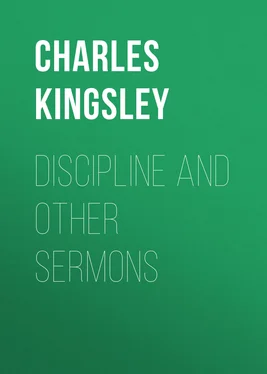Charles Kingsley - Discipline and Other Sermons
Здесь есть возможность читать онлайн «Charles Kingsley - Discipline and Other Sermons» — ознакомительный отрывок электронной книги совершенно бесплатно, а после прочтения отрывка купить полную версию. В некоторых случаях можно слушать аудио, скачать через торрент в формате fb2 и присутствует краткое содержание. Жанр: foreign_prose, foreign_religion, Философия, foreign_psychology, foreign_antique, на английском языке. Описание произведения, (предисловие) а так же отзывы посетителей доступны на портале библиотеки ЛибКат.
- Название:Discipline and Other Sermons
- Автор:
- Жанр:
- Год:неизвестен
- ISBN:нет данных
- Рейтинг книги:4 / 5. Голосов: 1
-
Избранное:Добавить в избранное
- Отзывы:
-
Ваша оценка:
- 80
- 1
- 2
- 3
- 4
- 5
Discipline and Other Sermons: краткое содержание, описание и аннотация
Предлагаем к чтению аннотацию, описание, краткое содержание или предисловие (зависит от того, что написал сам автор книги «Discipline and Other Sermons»). Если вы не нашли необходимую информацию о книге — напишите в комментариях, мы постараемся отыскать её.
Discipline and Other Sermons — читать онлайн ознакомительный отрывок
Ниже представлен текст книги, разбитый по страницам. Система сохранения места последней прочитанной страницы, позволяет с удобством читать онлайн бесплатно книгу «Discipline and Other Sermons», без необходимости каждый раз заново искать на чём Вы остановились. Поставьте закладку, и сможете в любой момент перейти на страницу, на которой закончили чтение.
Интервал:
Закладка:
But how to serve him, and where? By doing something strange and fantastic? By giving up thy business, money, time? Going to the ends of the earth? Making what some will call some great sacrifice for God?
Not so. All that may be, and generally is, the fruit of mere self-will and self-conceit. God has made a sacrifice for thee. Let that be enough. If he wants thee to make a sacrifice to him in return, he will compel thee to make it, doubt it not. But meanwhile abide in the calling wherein thou art called. Do the duty which lies nearest thee. Whether thou art squire or labourer, rich or poor; whether thy duty is to see after thy children, or to mind thy shop, do thy duty. For that is thy vocation and calling; that is the ministry in which thou canst serve God, by serving thy fellow-creatures for whom Christ died.
This day the grand prayer has gone up throughout Christ’s Church—and thou hast joined in it—for all estates of men in his holy Church; for all estates, from kings and statesmen governing the nations, down to labouring men tilling in the field, and poor women washing and dressing their children at home, that each and all of them may do their work well, whatever it is, and thereby serve the Living God. For now their work, however humble, is God’s work; Christ has bought it and redeemed it with his blood. When he redeemed human nature, he redeemed all that human nature can and ought to do, save sin. All human duties and occupations are purified by the blood of Christ’s cross; and if we do our duty well, we do it to the Lord, and not to man; and the Lord blesses us therein, and will help us to fulfil our work like Christian men, by the help of his Holy Spirit.
And for those who know not Christ? For them, too, we can pray. For, for them too Christ died. They, too, belong to Christ, for he has bought them with his most precious blood. What will happen to them we know not: but this we know, that they are his sheep, lost sheep though they may be; and that we are bound to pray, that he would bring them home to his flock.
But how will he bring them back? That, again, we know not. But why need we know? If Christ knows how to do it, surely we need not. Let us trust him to do his own work in his own way.
But will he do it? My friends, if we wish for the salvation of all Jews, Turks, Infidels, and Heretics, do you suppose that we are more compassionate to them than God who made them? Who is more likely to pity the heathen? We who send a few missionaries to teach them: or God who sent his own Son to die for them?
Oh trust God, and trust Christ; for this, as for all other things. Believe that for the heathen, as for us, he is able to do exceedingly and abundantly beyond all that we can ask or think; and believe too, that if we do ask, we do not ask in vain; that this collect which has gone up every Good Friday for centuries past, from millions of holy hearts throughout the world, has not gone up unheard; that it will be answered—we know not how—but answered still; and that to Jew and Turk, Heathen and Heretic, this day will prove hereafter to have been, what it is to us, Good Friday.
SERMON VI
FALSE CIVILIZATION
Thus saith the Lord of hosts, the God of Israel; Jonadab the son of Rechab shall not want a man to stand before me for ever.
Let us think a while this morning what this text has to do with us; and why this strange story of the Rechabites is written for our instruction, in the pages of Holy Scripture.
Let us take the story as it stands, and search the Scriptures simply for it. For the Bible will surely tell its own story best, and teach its own lesson best.
These Rechabites, who were they? Or, indeed we may ask—Who are they? For they are said to exist still.
They were not Israelites, but wild Arabs, a branch of the Kenite tribe, which claimed—at least its chiefs—to be descended from Abraham, by his wife Keturah. They joined the Israelites, and wandered with them into the land of Canaan.
But they never settled down, as the Israelites did, into farmers and townsfolk. They never became what we call civilized: though they had a civilization of their own, which stood them in good stead, and kept them—and keeps them, it would seem, to this day,—strong and prosperous, while great cities and mighty nations have been destroyed round about them. They kept their old simple Arab customs, living in their great black camels’ hair tents, feeding their flocks and herds, as they wandered from forest to forest and lawn to lawn, living on the milk of the flock, and it would seem, on locusts and wild honey, as did John the Baptist after them. They had (as many Arab tribes have still) neither corn, seed-field, nor vineyard. Wild men they were in their ways, yet living a simple wholesome life; till in the days of Ahab and Jehu there arose among them a chief called Jonadab the son of Rechab, of the house of Hammath. Why he was called the son of Rechab is not clearly known. ‘The son of the rider,’ or ‘the son of the chariot,’ seems to be the most probable meaning of the name. So that these Rechabites, at least, had horses—as many Arab tribes have now—and whether they rode them, or used them to draw their goods about in carts, like many other wild tribes, they seem to have gained from Jonadab the name of Rechabim, the sons of Rechab, the sons of the rider, or the sons of the chariot.
Of Jonadab the son of Rechab, you heard three Sundays since, in that noble passage of 2 Kings x. where Jehu, returning from the slaughter of the idolatrous kings, and going to slay the priests of Baal, meets Jonadab and asks him, Is thy heart right—that is, sound in the worship of God, and determined to put down idolatry—as my heart is with thy heart? We hear of him and his tribe no more till the days of Jeremiah, 250 years after, in the story from which my text is taken. What Jonadab’s reasons may have been for commanding his tribe neither to settle in towns, nor till the ground, it is not difficult to guess. He may have dreaded lest his people, by settling in the towns, should learn the idolatry of the Israelites. He may have dreaded, likewise, lest they should give way to that same luxury and profligacy in which the Israelites indulged—and especially lest they should be demoralized by that drunkenness of which the prophets speak, as one of the crying sins of that age. He may have feared, too, lest their settling down as landholders or townsmen would cause them to be absorbed and lost among the nation of the Israelites, and probably involved in their ruin. Be that as it may, he laid his command upon his tribe, and his command was obeyed.
Of the after-history of these simple God-fearing folk we know very little. But what we do know is well worth remembering. They were, it seems, carried away captive to Babylon with the rest of the Jews; and with them they came back to Jerusalem. Meanwhile, they had intermarried with the priests of the tribe of Levi; and they assisted at the worship and sacrifices,—‘standing before the Lord’ (as Jeremiah had foretold) ‘in the temple,’ but living (as some say) outside the walls in their tents. And it is worth remembering, that we have one psalm in the Bible, which was probably written either by one of these Rechabites, or by Jeremiah for them to sing, and that a psalm which you all know well, the old man’s psalm, as it has well been called—the 71st Psalm, which is read in the visitation of the sick; which says, ‘O God, thou hast taught me from my youth: and hitherto have I declared thy wondrous works. Now also when I am old and grey-headed, O God, forsake me not; until I have shewed thy strength unto this generation, and thy power to every one that is to come.’
It was, moreover, a Rechabite priest, we are told—‘one of the sons of the Rechabim spoken of by Jeremiah the prophet’—who when the Jews were stoning St. James the Just, one of the twelve apostles, cried out against their wickedness.
Читать дальшеИнтервал:
Закладка:
Похожие книги на «Discipline and Other Sermons»
Представляем Вашему вниманию похожие книги на «Discipline and Other Sermons» списком для выбора. Мы отобрали схожую по названию и смыслу литературу в надежде предоставить читателям больше вариантов отыскать новые, интересные, ещё непрочитанные произведения.
Обсуждение, отзывы о книге «Discipline and Other Sermons» и просто собственные мнения читателей. Оставьте ваши комментарии, напишите, что Вы думаете о произведении, его смысле или главных героях. Укажите что конкретно понравилось, а что нет, и почему Вы так считаете.












